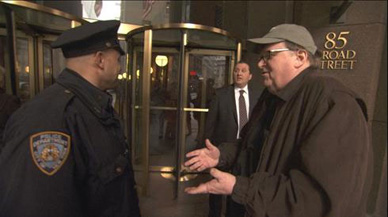Movie Review - Capitalism: A Love Story
By Matthew Huntley
October 5, 2009
Going into Capitalism: A Love Story, I expected Michael Moore would push my buttons. I also expected lurid imagery, shocking statistics, intense crowd reactions and powerful emotional moments. Moore delivered all of these through his usual style of propaganda (not to be confused with documentary), and even if you don't agree with him, he can still entertain you. Lucky for me, I happen to agree with him.
Before the screening, my colleague and I discussed what it would take for us to like this movie, and we agreed it would have to be Moore presenting us with information we didn't already know (or hadn't thought that much about) — thus, educating us — and a progressive message (because most would agree there is something wrong with our current economic state and it needs to change). Plus, the movie would have to be entertaining, as Moore's films often are.
His subject this time is capitalism, which more or less serves as the backbone for his other films' subjects, be it corporate downsizing (Roger & Me), the selling of firearms (Bowling for Columbine), war and politics (Fahrenheit 9/11), or health care (Sicko). The film is a platform for Moore to express his disdain for our current financial system, an ideology that continually widens the gap between the rich and the poor.
Proponents of capitalism will argue it's a free market system that allows people to make their own decisions and become whatever they want. But it's more accurate to say it's a system that allows people to *try* and be whatever they want. Moore's underlying argument is that nothing is guaranteed — not housing, not education, not food, not health care — even though it ought to be. Late in the film, he shows us archival footage of Franklin Delano Roosevelt giving a speech that expresses his longing for a government that would assure basic human needs, despite one's economic class. It's a shame FDR died so shortly after delivering this address; he might have enforced it.
Obviously, Moore concentrates heavily on Wall Street's devastating plunge in the fall of 2008 and the subsequent government's bailout that only perpetuated a system in which the rich get richer and the poor get poorer. All his interviews — with grieving families who've lost their homes or their loved ones; members of congress who grow indignant because they can't explain where all our money went; blue-collar employees; church leaders — build up to his condemnation of the U.S. government and he provides us startling information that most people have probably never thought about.
I never knew, for example, that some companies take life insurance policies out on their employees and essentially profit from their deaths (these are known as "Dead Peasant" policies). Nor was I aware that many kids in a small Pennsylvania town served time in a juvenile detention center for relatively bogus charges. The kids mention their sentences were extended without even meeting with the judge. Why? Because the judge had financial interest in the detention center he sent them to. I also didn't know the salary for some commercial pilots is less than what a Taco Bell manager makes (not to denounce Taco Bell managers, but come on). The bottom line is our system is sustained at a cost to people who can't afford it.
The information Moore presents is always interesting, sometimes fascinating, but he doesn't always relay it the best way. His techniques are usually effective and humorous, but I found some of the theatrics to be immature and cheap. For instance, during a speech by George W. Bush, Moore animates the background and throws in a series of visual jokes. Because it's already so obvious that Bush's words are empty and full of misdirection, the illustrations are overkill (although the footage from "Jesus of Nazareth" pays off splendidly).
Moore's transitions don't always feel right, either, as when he makes a questionable sequitur to footage of Hurricane Katrina. In the context of the scene, I understand what he was getting at by showing yet another way poor people in the United States have it rough, but his example makes it seems like capitalism was the cause for Katrina. It's not exactly clear why he used such footage and it seems out of place.
As usual, Moore doesn't allow the other side a voice. We never get to hear an intelligent rebuttal from the people who disagree with him (doesn't he know that would make his argument more complete and well rounded?). Still, amidst the sensationalism and extremities in favor of his plea, what makes Capitalism so watchable is its underlying hope that anyone, peasant or not, can and will make a difference. Moore shows us recent examples of how workers, neighborhoods, even local law enforcement, have banded together to say they're not leaving without getting what's owed to them.
Whether or not you agree with Moore or even believe what he's telling you, Capitalism is a tough and entertaining piece of propaganda filmmaking. It's not as potent as Roger & Me or Sicko, but it's relevant and compelling.
For his progressive message, Moore is asking us to join the fight and share the wealth. He wants us to have the courage to stand up to the system, and when our situation is this desperate, we have to be willing to try. Based on this film's inspirational footage, we know it can happen and succeed. It needs to continue to happen and succeed.




